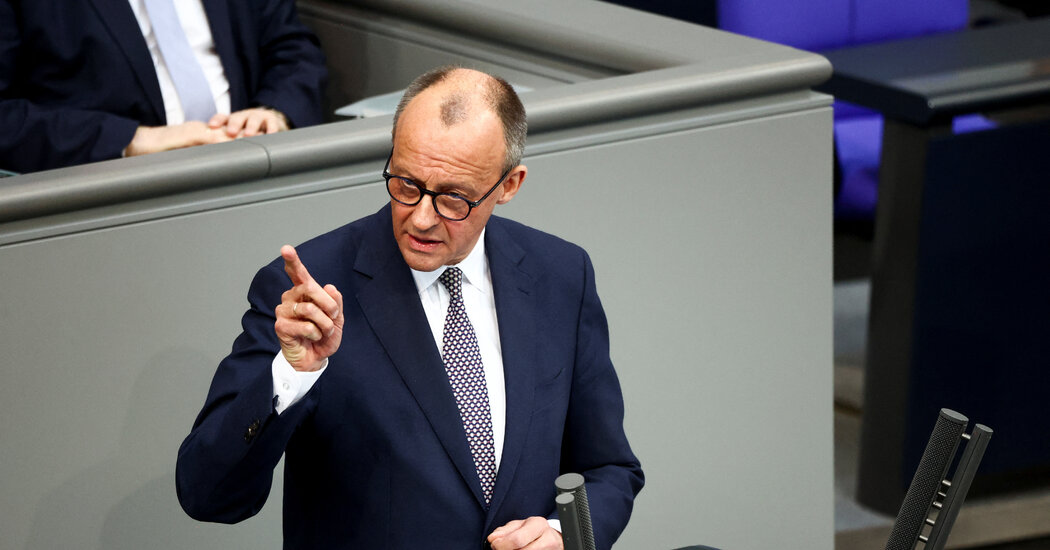Germany’s centrist parties announced on Wednesday that they had formally reached a coalition agreement to allow Friedrich Merz, a conservative, to take the reins as chancellor at a tumultuous moment when Europe’s economic and security order is being upended.
Since Mr. Merz’s Christian Democrats came out on top in elections in February, he has been under tremendous pressure to get a government moving as the Trump administration batters Europe with tariffs, threatens the NATO alliance and cozies up to an aggressive and expansionist Russia.
Sensing the urgency, Mr. Merz took the exceptional step of using the interim period to push measures through Parliament to raise debt limits so that Germany could throw billions more at infrastructure and military spending. The coalition agreement announced on Wednesday was the fastest since 2009, when Angela Merkel won her second term.
Nonetheless, Germany, Europe’s largest economy, has been left virtually leaderless during the multiple overlapping global crises.
“We don’t yet know which direction the international situation will take, but that is why our message today is all the clearer: In this global change we want to — and we will — help shape Germany,” Mr. Merz told reporters as the coalition plan was presented.
The far-right Alternative for Germany, which finished second in the February election, has continued to rise in polls, but the mainstream parties had vowed not to partner with it because it is considered a threat to German democracy.
Instead, Mr. Merz’s conservatives will join with the center-left Social Democrats of the departing chancellor, Olaf Scholz, reconstituting the kind of centrist coalition that long dominated German politics. While the agreement still needs to be approved by each party, Mr. Merz is expected to be sworn in in early May.
Uwe Jun, a politics expert who teaches at the University of Trier, in western Germany, said that, because of the world political situation, the Christian Democrats and the Social Democrats “feel that Germany needs a government capable of action, and this has become even clearer from Trump’s actions in recent days.”
The coalition deal includes compromises on issues such as taxes, infrastructure spending, defense and migration. For Mr. Merz, who promised a political change during the campaign, it was important to show that his government would be substantially different from Mr. Scholz’s, which was hobbled by infighting that forced him to call elections more than half a year ahead of schedule.
Party leaders had spent the final hours negotiating tax brackets and pensions, with the Social Democrats insisting on higher taxes for top earners and the business-friendly conservatives demanding that a tax put in place to pay for reunification be struck down, according to reports.
The coalition partners agreed to stiffen measures to prevent illegal migration and to undo some recent changes that had made it easier to become a German citizenship. They will also reduce some taxes, including on overtime pay, and reduce unemployment benefits, hoping to push more Germans into the work force. The new government will also create a ministry focused on digitalization, Mr. Merz said.
Critics worry that the government, sometimes called a “black-red” coalition for the party colors, lacks the broad vision needed to lift Germany out of its economic funk and stop the rise of the AfD.
Polls show that Germans — deeply worried about the state of global affairs — have started losing trust in Mr. Merz even since the election, wary of his new spending measures and the appearance that he has conceded too much to his coalition partner.
Daniel Friedrich Sturm, writing in Der Tagesspiegel, Berlin’s largest daily newspaper, noted, “It is now really time for the black-red negotiators to finally get their act together — and for the citizens to be able to see six and a half weeks after the election what this potential government wants to tackle and how.”
Recent polls suggest that the AfD, which won 20.8 percent of the vote in February, and the conservatives, which took 28.6 percent, would be running neck and neck if an election were held now. On Wednesday, one poll put the AfD at the top with 25 percent, ahead of the conservatives, who got 24 percent. It’s the first poll showing a far-right party in the lead since the end of the Nazi era.
After some leaks about the coalition talks, members of Mr. Merz’s party criticized him for not being tough enough with the Social Democrats. Though that party received only 16.4 percent of the February vote, it is widely seen as having had the upper hand in coalition talks.
Some conservative party members were particularly irked by an expensive infrastructure commitment that Mr. Merz helped pass, despite frequent assurances during the campaign that he would not borrow before trying to find money in the regular budget.
“Where is the promised new direction in migration policy?” the Cologne chapter of the youth wing of Mr. Merz’s party challenged him in a letter cited by the German news media, adding, “Where is the economic turnaround we announced?”
